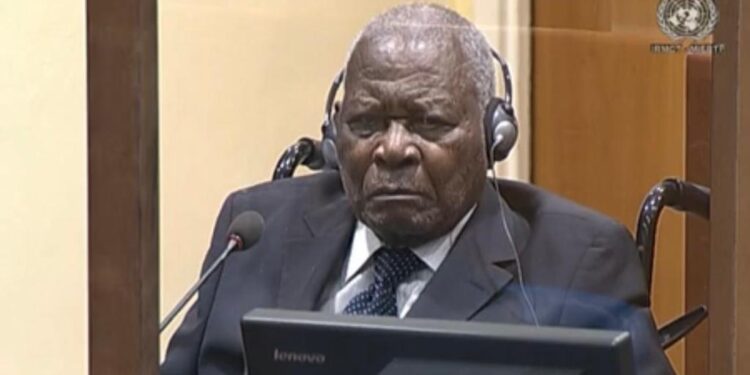The trial of Félicien Kabuga, the alleged financier of the 1994 Rwandan genocide, for six counts of genocide and crimes against humanity, is scheduled to start before the United Nations’ International Residual Mechanism for Criminal Tribunals on September 29, 2022.
“The chamber orders the trial to commence in its branch in The Hague with the opening statements from September 29 … and the first depositions from October 5,” said Judge Iain Bonomy during an in-person pre-trial conference in the Mechanism’s Hague branch courtroom on Thursday, August 18, 2022.
The ruling settled the matter of the venue of the trial. A French court had ordered that Kabuga be transferred to Arusha to the Mechanism’s branch there for his trial, initially scheduled to start at the end of 2021. It was postponed due to the suspect’s ill health. However, the judges had suspended the directive indefinitely.
The court also told Kabuga to appear in court three times a week for at least two hours, either in person or through video link.
Asked if he wanted to address the court, Kabuga reiterated to Judge Bonomy (presiding), Judge Graciela Gatti Santana, and Judge Elizabeth Ibanda-Nahamya, his request to change his lead counsel, Emmanuel Altit. Since last year, the Rwandan has complained that Altit has failed to provide case information and documents to him and his family.
Judge Bonomy said the matter is under consideration and that the court will rule on the request soon.
In June 2022, the court found Kabuga fit to stand trial.
Kabuga is facing charges of genocide; direct and public incitement to commit genocide; conspiracy to commit genocide; persecution on political grounds; extermination; and murder, all considered as crimes against humanity, committed in Rwanda in 1994.
According to the indictment, between April 6, 1994, and July 17, 1994, genocide against the Tutsi ethnic group occurred in Rwanda. At the time, there were widespread and/or systematic attacks against the civilian population based on Tutsi ethnic identification and/or political grounds.
According to the charges, Kabuga, a founder of the infamous radio station, Radio Television Libre des Milles Collines (RTLM), operated it with others in a manner that furthered hatred and violence against Tutsis and others, and that he and others agreed to disseminate an anti-Tutsi message to eliminate the ethnic group from Rwanda.
The indictment alleges that RTLM directly and publicly incited the commission of genocide and persecution through denigrating and threatening broadcasts. These broadcasts expressly identified persons as Tutsi or as “accomplices” or “allies” of the then rebel Rwandan Patriotic Front, and provided locations and other information that encouraged or facilitated their killing.
The indictment also alleges that Kabuga is liable for these crimes based on his participation in a joint criminal enterprise with others involved in RTLM’s operations, as well as aiding and abetting the criminal conduct of RTLM journalists, the Interahamwe, and others whose crimes were assisted or instigated by RTLM broadcasts.
Kabuga is further charged with aiding and abetting the Interahamwe, who killed and harmed Tutsis and others in Kigali, Gisenyi, and Kibuye prefectures by providing them with material, and logistical, financial, and moral support.
He is further alleged to have raised funds to purchase weapons and ammunition, and to have played a role in importing arms and ammunition which were distributed to the Interahamwe in Gisenyi préfecture for the purpose of committing crimes.
Kabuga, who was arrested in France in May 2020 after more than 20 years on the run, pleaded not guilty on November 11, 2020. He is in the custody of the Mechanism’s detention unit in The Hague.







